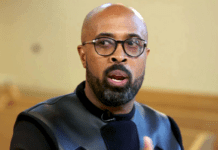Pietro Groppi, a 23-year-old from Piacenza who got de-baptized in May 2021, said that the first question he asked himself before sending his form was “Do I believe or not?” and the answer was simply, “No.”
But for many, abandoning the church is a statement against its positions on LGBTQ rights, euthanasia and abortion.
Nanetti said that being de-baptized helped him affirm his own identity as bisexual. “I had to get distance from some of the church’s positions on civil rights matters,” he said.
The church’s stance on sexuality helped pushed Groppi to seek out de-baptism as well, though he’s not affected personally. He finds the Vatican’s position on these matters “absurd,” and he’s unhappy with how the church meddles with Italian politics.
Francesco Faillace, 22, now going through the de-baptism procedure, said: “I’ve been an atheist since basically forever. For the church, being baptized means that you’re a Catholic, but that’s not the case. I’ve personally been baptized for cultural reasons more than religious, because that’s how it goes in Italy.”
Faillace believes that if all the people who don’t truly identify as Catholics were to be de-baptized, official percentages of Italian Catholics would be significantly lower.
The latest data seems to back him up. In 2020, sociologist Francesco Garelli conducted a large study financed by the Italian Catholic Bishops Conference that concluded that 30% of the Italian population is atheist — around 18 million people.
The Rev. Alfredo Scaroni, pastor in a town of 9,000 in northern Italy, has noticed an increasing number of people distancing themselves from the church. If more than 15% of the population appear at Sunday Mass, he said, it is an achievement.
“The church is having a large conversation on atheism, and, from our side, we need to practice more acceptance and attention,” Scaroni said.
Grendene, of the UAAR, said many Italians are still unaware of de-baptism as an option. In the past, the association would organize “de-baptism days” to advertise it, he said, but it turns out that the church itself is de-baptism’s best promoter.
“Whenever the Vatican is at the center of a controversy, we see the access to our website grows dramatically,” said Grendene, pointing out that on two days in June, traffic on the UAAR website went from a daily average of 120 visitors to more than 6,000.
Not coincidentally, perhaps, a few days earlier the Vatican sent a note to the Italian government, asking to change some of the language in a proposed law aimed at criminalizing discrimination based on sex, gender, sexual orientation, gender identity and disability.
This article originally appeared here.











